Politics
Istanbul ‘may break 110-year temperature record for March’
ISTANBUL
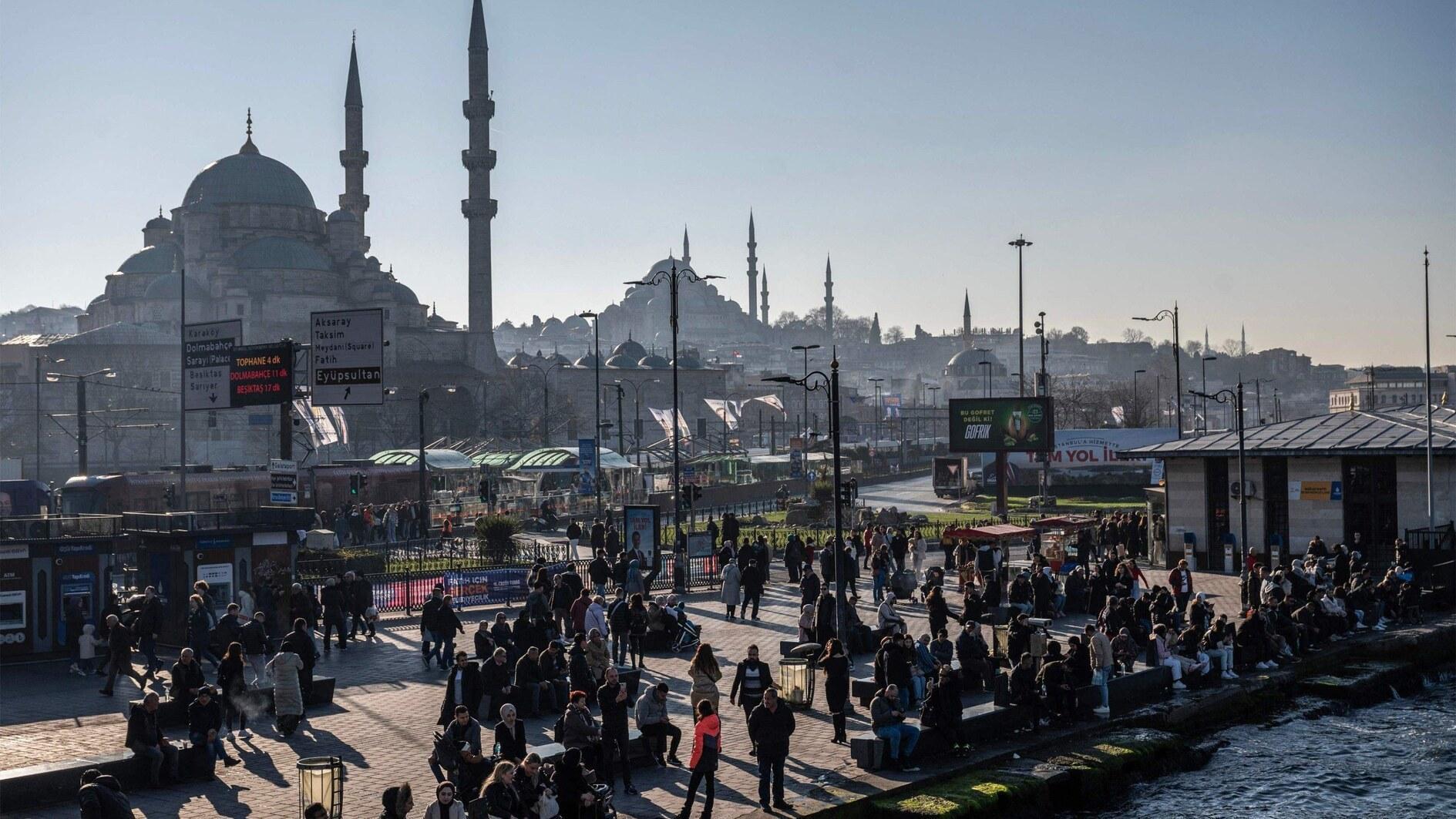
Istanbul is bracing for an extreme weather shift this weekend, with record-high temperatures driven by warm air and desert dust from North Africa expected before a sudden drop at the start of the new week, warns a meteorologist.
class=”cf”>
Last month, temperatures dropped sharply as snowfall blanketed Istanbul and many other regions of the country; however, following this bitter cold snap, temperatures have recently surged above seasonal averages in the metropolis.
“Until Sunday [March 16], temperatures will rise and desert dust will reach the city, with that day expected to witness the highest temperatures,” explained Adil Tek, a meteorological engineer at Kandilli Observatory.
Tek indicated that Istanbul might face extraordinary heat, potentially surpassing a 110-year record, with temperatures unseasonably climbing to 27-28 degrees Celsius during this period.
“We have never observed such high temperatures for this time of year,” Tek explained, linking the trend to climate change.
Saharan dust, which is currently impacting western Türkiye, will begin to lose its effect starting March 16, Tek noted. However, he recommended that individuals with respiratory conditions and the elderly take precautions over the weekend, such as wearing masks and limiting outdoor activities.
class=”cf”>
After the unseasonable warmth and dust clouds, a swift temperature drop is anticipated early next week as a cold snap moves in from the north, bringing rain to Istanbul and potentially snow to other parts of Türkiye.
“Temperatures will drop significantly, and snowfall is likely in the western Black Sea, central regions, inner Aegean and Eastern Anatolia, including Ankara,” Tek noted, emphasizing that residents should brace for drastic changes as winter conditions could return by midweek.
Politics
Türkiye captures 2 suspected of spying for Mossad in Istanbul
The National Intelligence Organization (MIT) detained two individuals in Istanbul on suspicion of working for Israel’s intelligence service, Mossad, in a joint operation with the city police and judicial authorities, security sources said Friday.
The suspects, identified as Mehmet Budak Derya and Veysel Kerimoğlu, spied for and transferred information to Mossad over an extended period. They had been under MIT surveillance for some time before being apprehended in an operation referred to as the “MONITUM Activity.”
According to security sources, Derya, a mining engineer, founded a company in 2005 and opened a marble quarry in the Silifke district of southern Mersin province, later exporting products to multiple countries. His international trade activities drew the attention of Mossad, which allegedly established contact with him through an individual operating under the code name “Ali Ahmed Yassin,” described as a representative of a front company set up by Israeli intelligence.
Sources said Yassin visited Derya in 2012, presenting a potential business opportunity and inviting him to a meeting with company executives in Europe. Derya allegedly traveled abroad in 2013, where he met with individuals posing as company owners but later identified as members of Israeli intelligence.
Investigators said that during these meetings, Derya was instructed to hire Kerimoğlu, a Turkish citizen of Palestinian origin, and report back on their joint activities. Authorities said Derya complied with the directive, hiring Kerimoğlu and maintaining close personal and professional ties with him, while allegedly receiving instructions and even salary payments for Kerimoğlu from intelligence operatives.
Intelligence, trade-linked activities
Security sources said that after hiring Kerimoğlu, Derya expanded commercial operations targeting Middle Eastern countries. Through Kerimoğlu, he allegedly developed social and business relations with Palestinians opposed to Israel’s policies toward Middle Eastern states, including Gaza, and shared information about these contacts with Israeli intelligence.
Authorities said Derya also sought entry permits to Gaza by leveraging commercial links and allegedly transmitted photographs of storage facilities he searched for in the territory to Mossad operatives.
Investigators further said Kerimoğlu proposed expanding their commercial ventures into drone parts trading in early 2016. Derya allegedly relayed the proposal to Israeli intelligence officials, and after receiving approval, the first product samples were reportedly supplied by Mossad. Authorities noted that one of the individuals the suspects allegedly attempted to sell drones to, Mohamed Zouari, was assassinated in Tunisia in 2016 by Israeli intelligence.
Derya maintained contact with Israeli intelligence from 2013 until his detention, holding meetings in several European countries with operatives using code names including “Luis,” “Jesus/Jose,” “Dr. Roberto/Ricardo,” “Dan/Dennis,” “Mark,” “Elly/Emmy” and “Michael.”
Israeli intelligence provided Derya with encrypted communication systems to maintain operational secrecy. He was also subjected to polygraph tests in an Asian country in 2016 and again in a European country in 2024, both of which he allegedly passed, after which he reportedly assumed a more advanced role in intelligence-related operations.
Derya also procured SIM cards, internet modems and router devices from Türkiye and other countries, transmitting photographs of device labels containing technical details such as serial numbers, production data and MAC addresses to Mossad contacts.
Derya was most recently tasked with establishing a front company abroad to infiltrate international supply chains. According to the alleged plan, the company would coordinate procurement and shipment of products from countries designated by Mossad to final destinations identified by Israeli intelligence, working with three legitimate companies operating in Asia at different stages of the logistics process.
Authorities said preparations for the company included establishing bank accounts, designing a website, opening social media accounts and conducting research into potential partner firms. Derya’s latest meeting with Mossad operatives regarding the project was reportedly held abroad in January.
Turkish intelligence, in recent years, has uncovered several spy networks operated by independent groups, terrorist organizations like Daesh, or foreign intelligence agencies in Türkiye.
According to Turkish security sources, Mossad often uses online communication applications to recruit operatives to spy on Palestinians and other foreign nationals living in Türkiye.
Politics
Canada PM Carney calls Türkiye vital NATO ally, signals deeper ties
Canadian Prime Minister Mark Carney on Thursday called Türkiye a key NATO ally for Canada and said the two countries have strong potential to deepen cooperation, especially in trade and industrial sectors.
“Let me reinforce a few things in it. One is Türkiye is a vital partner in NATO, a vital partner in a very important and sometimes challenging part of the world,” Carney told reporters at a news conference in Vaughan.
Highlighting economic cooperation, he said: “In addition, there is tremendous opportunity. We have a series of opportunities to deepen our commercial relationships with Türkiye,” noting that he had begun discussions with President Recep Tayyip Erdoğan in New York at the U.N. General Assembly in September last year and planned to follow up.
He added that cooperation could extend to “aspects of defense cooperation and nuclear cooperation” while stressing the broader scope of the relationship.
“I’ll just make the observation that since we’re here, Türkiye is one of the leaders in manufacturing globally, including advanced manufacturing,” Carney said, noting that there are “areas where we can partner without question.”
During the news conference, Carney also announced “a new, more ambitious sovereign path” for Canada’s auto sector, unveiling a national automotive plan that includes $2.3 billion in new purchase and lease incentives to boost zero-emission vehicle adoption.
As part of the shift, the government is repealing the previous electric vehicle (EV) sales mandate and replacing it with stricter greenhouse gas emission standards for model years 2027 to 2032.
“We’re tightening by twofold our (greenhouse gas) emissions standards, and we’re giving the industry the flexibility on how they achieve that,” Carney said.
Canada suspended drone technology sales to Türkiye in 2020 after concluding its optical equipment attached to Turkish-made drones had been used by Azerbaijan while fighting illegally occupying Armenian forces in Karabakh, the Azerbaijani enclave Baku has since liberated.
In January 204, it announced it had dropped weapon export controls on drone parts, including the imaging and targeting system, shortly after Türkiye formally approved Sweden’s NATO membership bid.
Politics
Türkiye condemns suicide attack on mosque in Pakistan
Türkiye on Friday condemned the suicide bombing that struck a mosque in the Pakistani capital during Friday prayers, voicing strong solidarity with Pakistan in its fight against terrorism.
In a written statement on the Turkish social media platform NSosyal, the Turkish Foreign Ministry said it “strongly condemns the terrorist attack carried out today against a mosque during Friday prayers in Islamabad.”
The statement extended condolences to the families of those who lost their lives and to the people of Pakistan, wishing mercy upon the victims. It also said Türkiye would continue to stand in solidarity with Pakistan in its counterterrorism efforts.
According to Pakistani authorities, at least 31 people were killed and more than 169 others injured when a suicide bomber blew himself up inside a mosque in Islamabad during Friday prayers. The explosion hit the Imambargah Mosque, a Shia Muslim place of worship in Islamabad’s Shehzad Town area.
Mosharraf Zaidi, Prime Minister Shehbaz Sharif’s spokesman, said the attack at the Imambargah in Islamabad “is only the latest in a series of murderous terrorist attacks orchestrated by India.”
“India’s terrorist proxies will neither slow down economic recovery, nor divide Pakistani hearts, nor undermine Pakistan’s growing diplomatic capital,” Zaidi stated on X. New Delhi was yet to react to the allegations made by Islamabad.
Politics
Erdoğan touts victory of hope in Türkiye’s quake-hit region
Time may never be enough to ease the pain of the 2023 earthquake, but Türkiye is a nation of resilience, President Recep Tayyip Erdoğan said Friday, hailing what he called a “victory of hope” in the disaster-hit region.
Erdoğan spoke to a solemn and welcoming crowd in Osmaniye, flanked by rows of brand-new apartments built for the survivors of the devastating earthquakes that struck southeast Türkiye starting before dawn on Feb. 6, 2023.
The magnitude 7.7 and 7.6 tremors killed more than 53,500 people, destroyed or severely damaged hundreds of thousands of buildings and caused an estimated $150 billion (TL 6.54 trillion) in economic losses across 11 provinces, including Kahramanmaraş, Hatay, Gaziantep, Adıyaman, Malatya and Şanlıurfa.
“I see a picture of dignity, a victory of hope, of having been able to achieve all this, of having trusted both your state and your nation in the darkest nights and overcome these difficulties heart to heart,” Erdoğan told the thousands gathered in the city’s renewed center, as some onlookers waved Turkish flags from the balconies of their new homes.
“We were shaken by the most devastating disaster in our country’s history. We will mourn, but we will not refrain from moving on either,” Erdoğan said. “I congratulate every one of you for not yielding to despair.”
“We vowed to overcome this disaster, and in under three years, we have rebuilt and revived our earthquake-hit cities. We have kept our promise to you,” Erdoğan said.
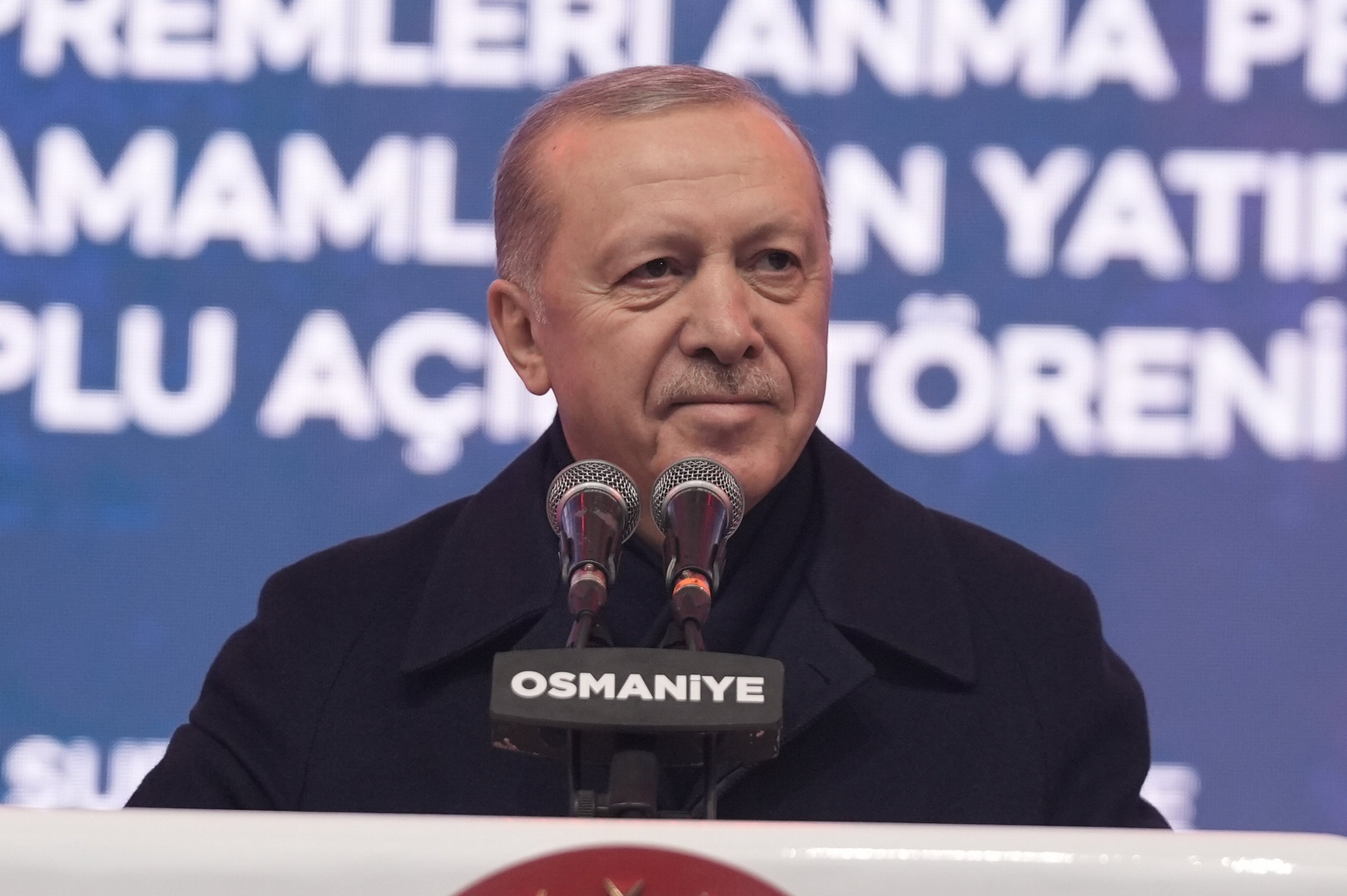
“To date, we have completed a total of 455,357 independent units, including 433,667 residences and 21,690 workplaces,” he noted.
Over TL 3.6 trillion has been used to repair damage and make cities stronger against disasters since Feb. 3, 2023, Erdoğan said, noting some TL 653 billion more has been allocated for 2026.
“I would like to express my heartfelt gratitude to all my fellow citizens for trusting us and sincerely supporting us from day one,” he added.
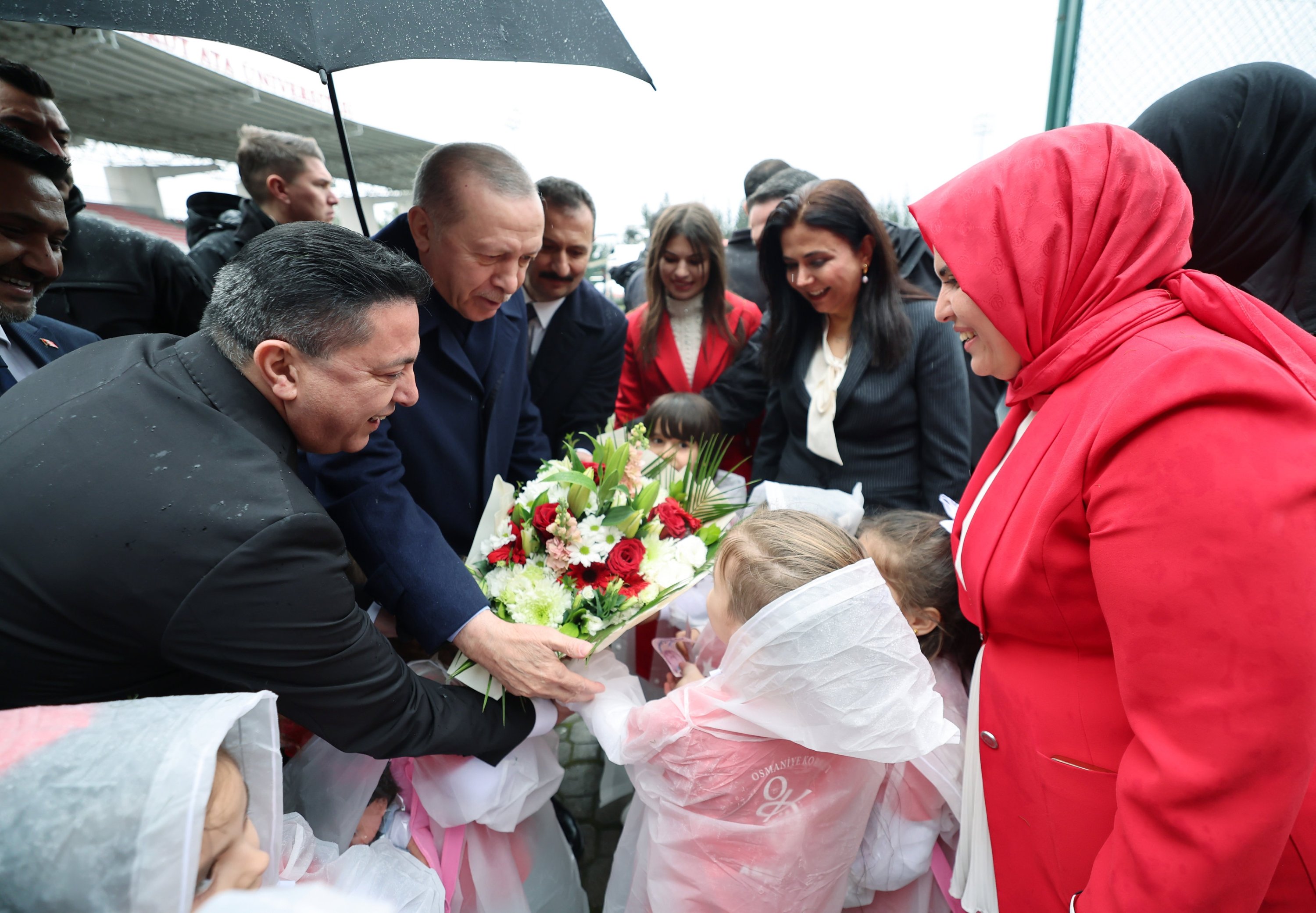
The Turkish president also hit out at his main opposition, the Republican People’s Party (CHP), for claiming his government’s pledge to rebuild homes for the disaster victims would not be fulfilled. Gesturing at the apartments before him, he said: “Here are the completed homes. No matter how much they deny it, our people know what we have accomplished.”
“We did not succumb to their toxic politics aimed at intimidating us and breaking our will,” he said. “We have shown the world the best example of state-nation solidarity, rose from our ashes and healed from the wounds of the earthquake together.”
Three years after devastating earthquakes, Türkiye has completed one of the largest reconstruction efforts in its history, rebuilding housing, infrastructure and economic networks across the affected provinces while mobilizing billions in domestic and international financing.
Rebuilding
Turkish officials launched a sweeping rebuilding program shortly after the disaster, pledging rapid housing reconstruction, economic revitalization and social rehabilitation.
Erdoğan repeatedly pledged to deliver permanent housing to survivors within a year, later expanding those commitments as construction progressed. More than 455,000 housing units and workplaces have been handed over to survivors across the quake-hit region as of early 2026.
Large-scale residential projects have been completed in districts such as Antakya and Defne in Hatay province, Nurdağı and Islahiye in Gaziantep province, and Onikişubat and Dulkadiroğlu in Kahramanmaraş province, areas that experienced some of the heaviest destruction. New housing developments incorporate stricter earthquake safety standards and expanded urban planning measures designed to improve long-term resilience.
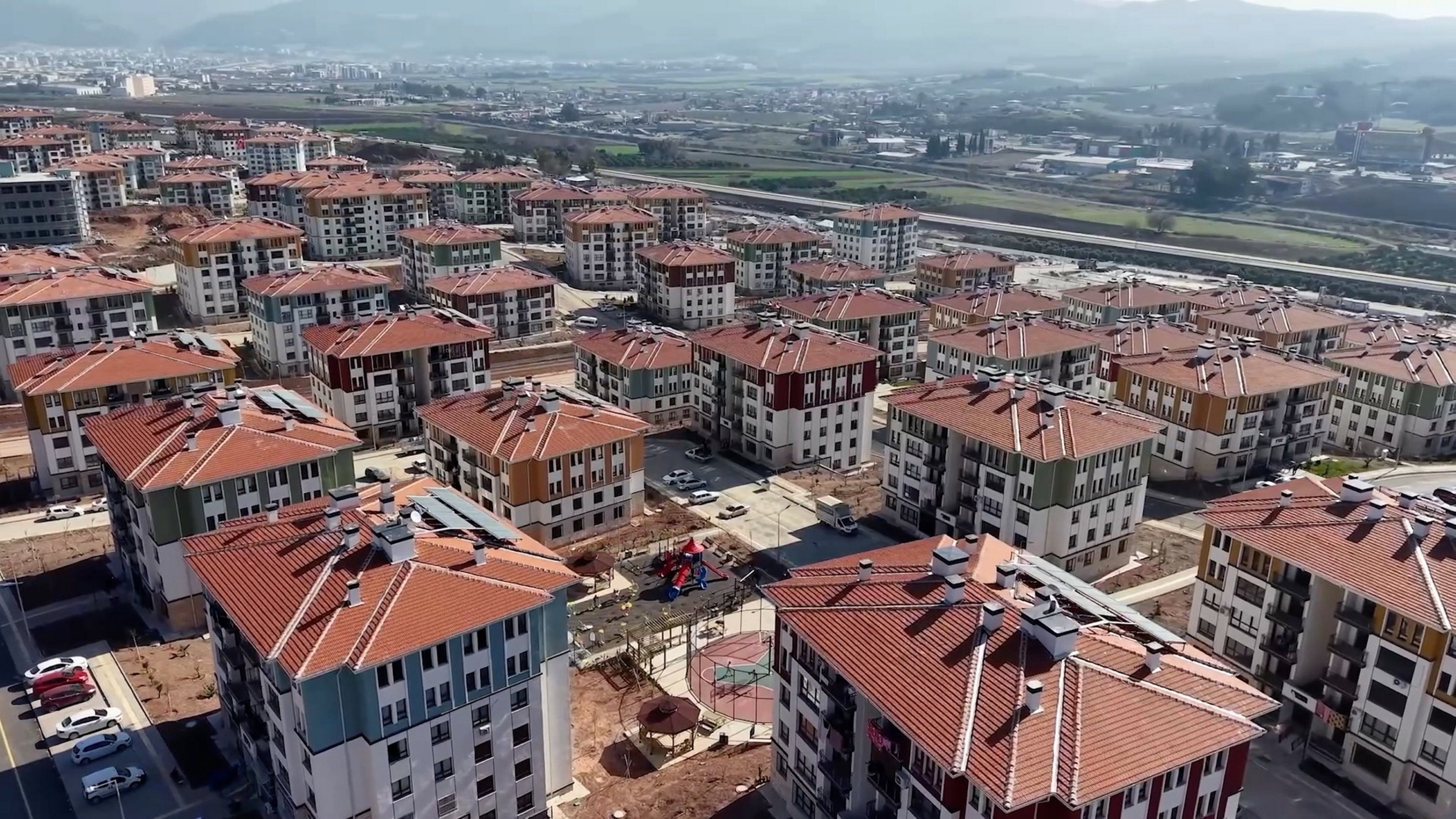
Government officials also prioritized rural reconstruction. International co-financing from the World Bank and the French Development Agency supported the rebuilding or renewal of approximately 2,800 rural homes, particularly in villages across Malatya and Adıyaman provinces.
Infrastructure, public services
Reconstruction has extended beyond housing to public infrastructure, including hospitals, schools, transportation networks and municipal services. New health care facilities have been constructed in Hatay, while dozens of schools have been rebuilt or reinforced across Kahramanmaraş and Adıyaman.
Urban transformation initiatives have introduced updated zoning regulations and strengthened construction oversight. Officials say new building codes require enhanced seismic resistance standards designed to reduce future disaster risks.
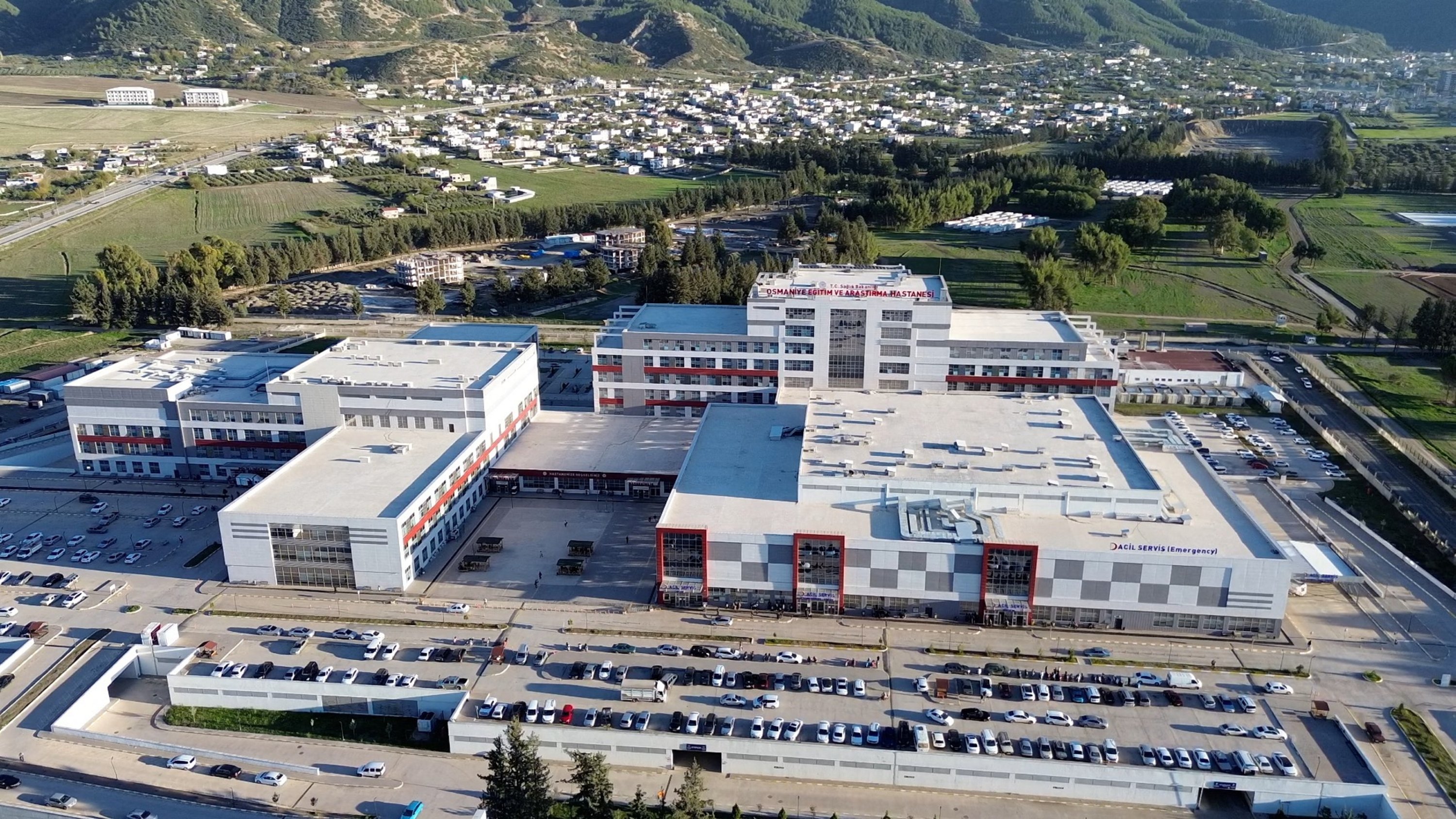
Global help, economic recovery
To finance recovery, Türkiye mobilized approximately TL 265 billion in external funding through partnerships with international financial institutions, development agencies and lenders. These funds supported rebuilding public infrastructure, strengthening urban resilience and sustaining economic activity in the region, officials say.
In 2023, the World Bank provided approximately TL 30.2 billion to support projects led by the Health Ministry, the Environment, Urbanization and Climate Change Ministry, and the state lender Ilbank. Another TL 13.7 billion was directed through the Small and Medium Enterprises Development and Support Administration, or KOSGEB, to help businesses maintain operations and preserve jobs.
The European Investment Bank added roughly TL 13.1 billion in financing that year for infrastructure and municipal recovery projects.
Additional international support continued in 2024. The World Bank provided approximately TL 18.3 billion for projects under the Industry and Technology Ministry and TL 7.4 billion for agricultural recovery programs through the Agriculture and Forestry Ministry. The Japan International Cooperation Agency extended about TL 11.8 billion to support urban reconstruction and health care investments.
Financing momentum continued into 2025 as reconstruction efforts expanded. The World Bank and the French Development Agency jointly provided approximately TL 14.4 billion to support rural housing projects. Meanwhile, the Islamic Development Bank contributed roughly TL 6.1 billion in long-term financing for urban transportation and reconstruction programs.
Authorities also launched the Disaster Reconstruction Fund in 2025 to accelerate rebuilding. The fund secured approximately TL 14.8 billion in financing, led by Abu Dhabi Commercial Bank with participation from Doğan Investment Bank.
Employment support
Officials said the financing programs were designed not only to rebuild physical infrastructure but also to stabilize regional economies. Funds have been directed toward protecting employment, preventing disruptions in credit access and ensuring liquidity for businesses, particularly small and medium-sized enterprises and exporters.
Economic rehabilitation measures included targeted loan programs, tax relief and investment incentives aimed at reviving manufacturing and agriculture across the affected provinces. Officials said these programs helped preserve production capacity and encouraged new investment in industrial zones in Gaziantep and Kahramanmaraş.
Social, cultural rehabilitation
Social recovery programs have focused on supporting displaced residents and restoring community life. Authorities established temporary accommodation centers, psychological support services and educational continuity programs for displaced students.
Cultural restoration projects have also been launched to rebuild historic sites and preserve regional heritage damaged in the disaster, particularly in Hatay, which contains numerous archaeological and religious landmarks.
Ongoing efforts
Government officials maintain that reconstruction efforts remain ongoing but say significant progress has been made in restoring normal living conditions across the region. Authorities project that full reconstruction and economic stabilization efforts will continue through the late 2020s as Türkiye completes long-term urban redevelopment and infrastructure strengthening projects in the region.
Politics
Türkiye’s AK Party rejects near-term early vote, eyes late 2027 scenario
A senior official from Türkiye’s ruling party said elections could be brought forward to November 2027 under certain conditions, while rejecting opposition calls for an early vote more than two years ahead of schedule.
Mustafa Elitaş, deputy chair of the ruling Justice and Development Party (AK Party), made the remarks during a public discussion event organized by the Turkish Press Federation.
Elitaş said that from a seasonal and logistical perspective, October or November would be the most suitable period for holding elections, citing weather conditions, school calendars and voter participation. He said November 2027 could be considered an appropriate time if elections were to be brought forward through a constitutional amendment.
Under Türkiye’s current election law, the next general election is scheduled for May 2028, while local elections are due in March 2029.
Elitaş dismissed claims that opposition leader Özgür Özel is genuinely pushing for early elections, arguing that Özel’s public statements have been inconsistent and shaped by internal party dynamics following the 2024 local elections.
Asked about comments by Nationalist Movement Party (MHP) leader Devlet Bahçeli, who previously described calls for early elections as “foolish,” Elitaş said an elected government should not abandon its mandate prematurely.
Elitaş said Türkiye’s political system provides clear legal frameworks for election timing and that any changes would require broad political agreement and constitutional procedures.
Politics
Fidan, Kos stress strategic value of Türkiye-EU relations, strong ties
Foreign Minister Hakan Fidan met with the European Commission’s commissioner for enlargement, Marta Kos, in Ankara on Friday, the Foreign Ministry said.
In a statement posted on the Foreign Ministry’s official NSosyal media account, it said the two held talks in the Turkish capital and shared images from the meeting.
In a joint statement released following the talks, Fidan and Kos confirmed Türkiye’s status as a candidate country and welcomed renewed mutual engagement in areas of shared interest, pledging to translate dialogue into concrete steps. They said five high-level dialogue meetings held in 2025 had helped advance EU support for Türkiye’s efforts to host refugees under temporary protection and improve Turkish citizens’ access to multiple-entry Schengen Area visas.
The two sides said recent global and regional developments have further underscored the strategic importance of Türkiye-EU relations. Fidan called for swiftly overcoming existing obstacles in bilateral ties and urged cooperation within a more comprehensive, institutional and multilayered framework. Both sides agreed that strengthening cooperation in areas including security and connectivity is of strategic importance in light of ongoing regional and global challenges.
Fidan and Kos also emphasized closer coordination to shape a regional connectivity agenda covering energy, transport, digitalization and trade, aimed at boosting stability, resilience and sustainable growth in the Black Sea, South Caucasus and Central Asia, highlighting Türkiye’s role as a central geopolitical actor in the region.
On economic ties, both sides reaffirmed the importance of Türkiye-EU economic integration. Fidan stressed the growing urgency of modernizing the customs union amid changing global trade dynamics, geopolitical and economic uncertainty, supply chain vulnerabilities, and the green and digital transitions. They agreed to continue working to improve the customs union’s implementation and to unlock its full potential to support competitiveness, economic security and resilience.
The sides welcomed the gradual resumption of European Investment Bank operations in Türkiye and said they intend to strengthen cooperation with the bank to support innovation-driven and sustainable projects in Türkiye and neighboring regions.
They also welcomed the adoption of a European Commission decision easing access for Turkish citizens to multiple-entry Schengen visas and underscored the importance of advancing the Visa Liberalization Dialogue, alongside enhanced cooperation on security and migration through high-level dialogue mechanisms.
Marking the anniversary of the devastating 2023 earthquakes, Kos paid tribute to those affected and reaffirmed the EU’s solidarity with Türkiye, including 1 billion euros ($1.18 billion) in emergency and reconstruction support. Fidan, citing the EU’s solidarity during the disaster, emphasized the importance of Türkiye-EU cooperation in all fields for the security, stability and prosperity of Europe.
-
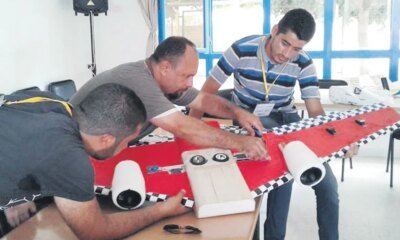
 Daily Agenda2 days ago
Daily Agenda2 days agoHistorical blow from MİT to Mossad: Trade-masked assassination network collapsed
-
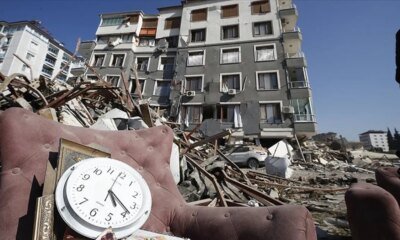
 Daily Agenda3 days ago
Daily Agenda3 days agoConsecutive posts from politicians on the third anniversary of the disaster of the century!
-
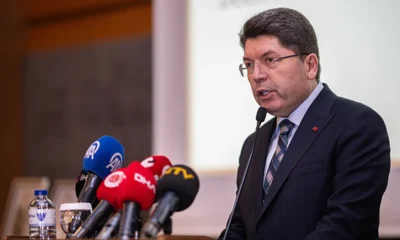
 Daily Agenda9 hours ago
Daily Agenda9 hours agoMinister of Justice Tunç: “The regulation regarding children involved in crime will come to the parliament after the commission works are completed.”
-

 Sports9 hours ago
Sports9 hours agoTurkish center Alperen Şengün named in 2026 NBA All-Star
-

 Sports3 days ago
Sports3 days agoTurkish football’s love for ‘African’ brilliance could finally pay off
-
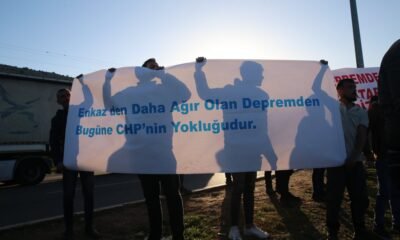
 Politics3 days ago
Politics3 days agoProtests, low turnout spoil CHP chair’s visit to Turkish quake zone
-
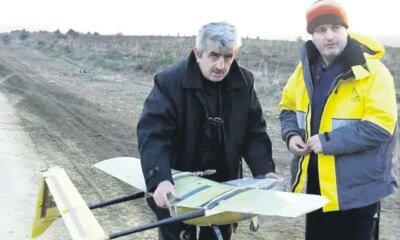
 Daily Agenda23 hours ago
Daily Agenda23 hours agoA Akıncı passed from this world
-
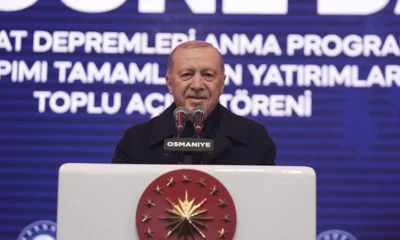
 Daily Agenda3 days ago
Daily Agenda3 days agoBreaking news! President Erdoğan spoke in Osmaniye on February 6: We were reborn to 86 million people, we showed the power of Türkiye!




